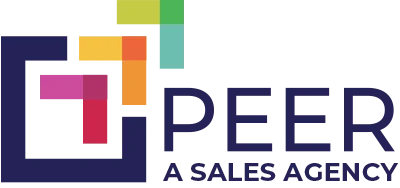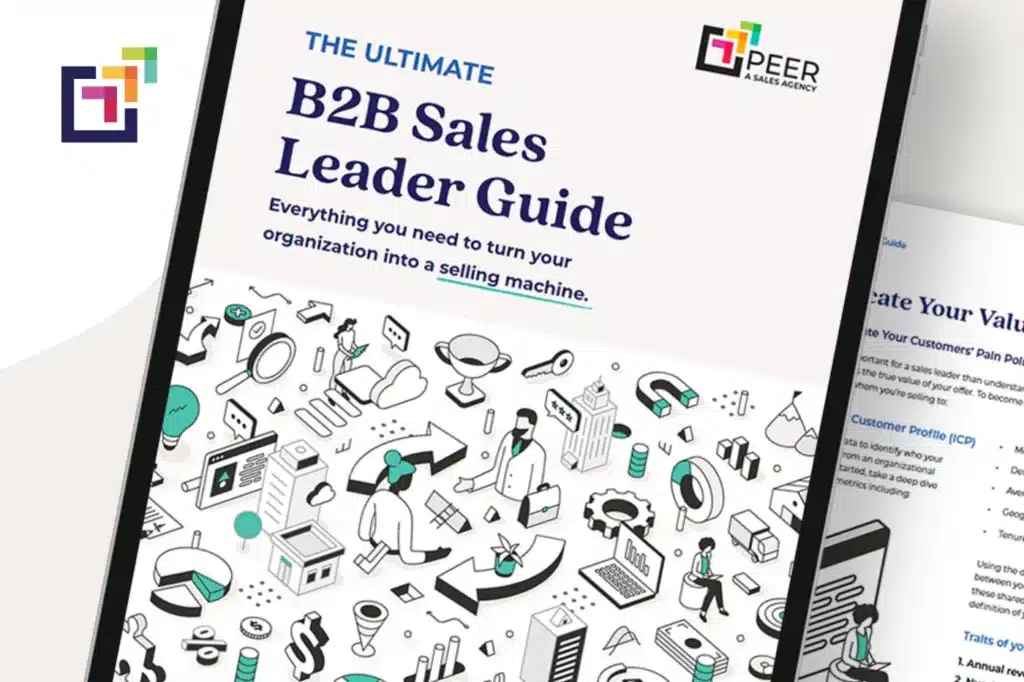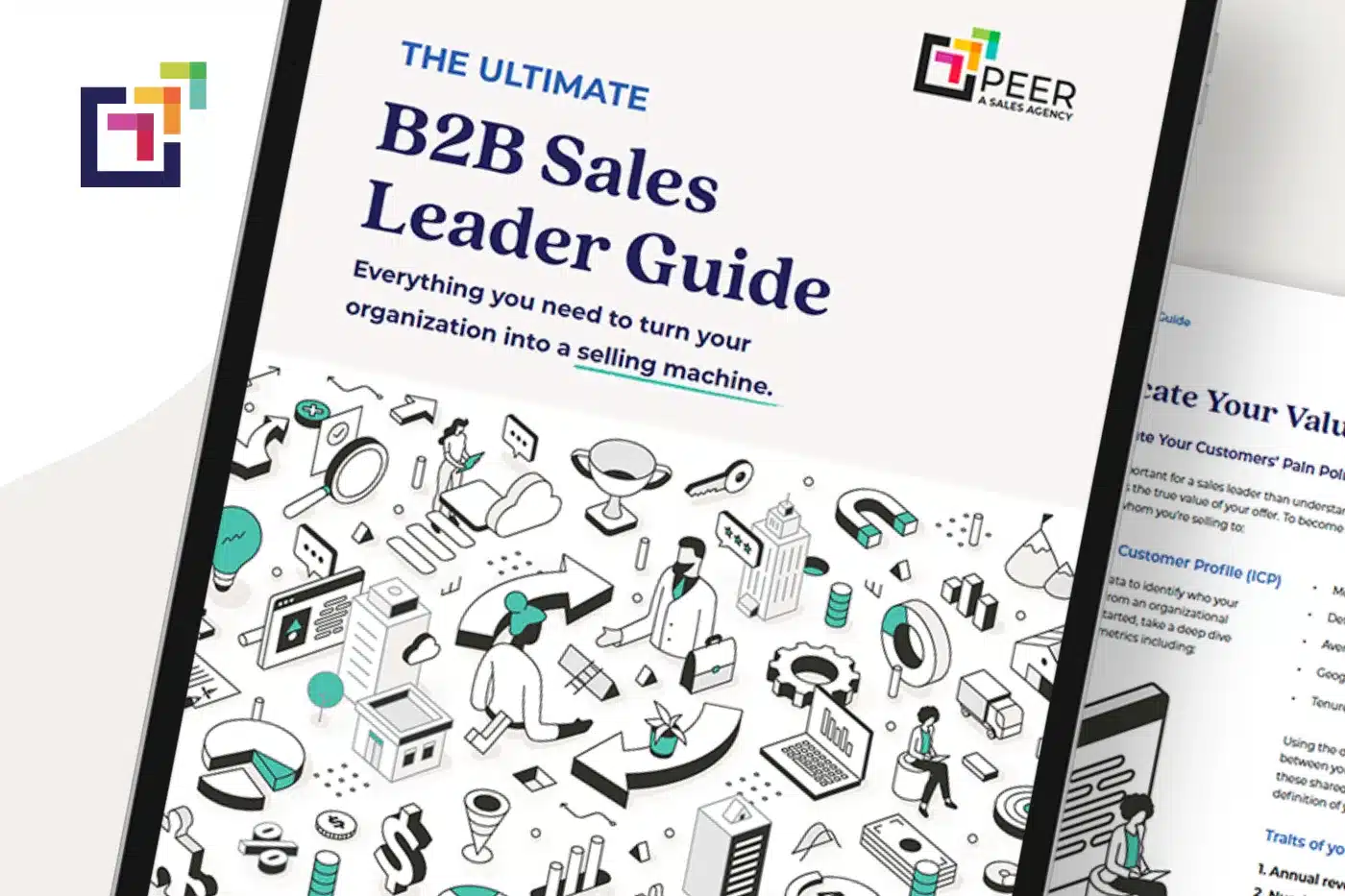AI tools for sales teams and AI assistants for marketing teams are everywhere now. Over the last 18 months, nearly every industry and job function has seen the explosion of AI use and adoption.
The future is here.
Small sales and marketing teams can use these new tools to compete with industry giants and reach more of your target market with more intelligent information, based on tools, research, and business intelligence that only the big boys could afford before AI.
From prospecting to ad targeting, generative AI tools can help your teams streamline processes and speed through testing and optimizations.
Your sales team can use AI for predictive analytics to forecast sales trends. Your marketing team can use AI marketing tools that automate email marketing and outreach campaigns based on real-time market intelligence tools that use natural language processing and machine learning to understand customer data and optimize the customer journey.
By integrating conversation intelligence, data enrichment tools, and AI agents, sales managers can get deeper insights into sales calls, unlocking better lead generation and sales prospecting processes.
For small teams aiming to improve their marketing efforts, speed up sales workflows, and strengthen customer service, there are AI tools that can help the smallest teams compete.
What We’ve Learned Using AI for Sales and Marketing
At Peer, we’ve spent the last 18 to 24 months exploring AI tools for sales and marketing teams, and we’ve learned a lot through trial and error!
First and foremost, right now, AI can dramatically enhance the capabilities of your current staff, but it can’t completely replace human expertise. Generative AI isn’t perfect, and you still need people to validate, test, and edit what AI agents put out. AI isn’t without flaws. It can (and does) make mistakes.
Secondly, you get out what you put in. Garbage in, garbage out. You’ll need to invest time and effort into training the AI tools you use with your best sales and marketing material. Personas, messaging matrices, call scripts, sales slicks, product guides, sales web pages, and landing pages can all be used to train your AI solutions. You’ll also need to invest time and testing into prompt creation: you and your team will need to figure out how to prompt and re-prompt your AI helper to get the information you need.
Next, AI tools are here now, and they’re likely to stay. Learn how to use these tools or start working with people, partners, and systems that know how to use AI on your behalf. Look for solutions with AI integrated into their tech stack: this can improve and accelerate results more effectively than many standalone AI tools.
In brief:
- AI supplements but doesn’t replace human roles.
- Good training enhances AI results.
- AI is here to stay.
- Integrated AI solutions are more efficient.
- Human oversight is crucial for success.
Questions We Get About AI From Sales Teams
We get a lot of questions about AI tools, especially from sales teams who want to use the latest and greatest methods to help them find and close more deals. Here are the top 4 questions we get:
- How can I automate mundane tasks for my team to make them more productive? AI agents can automate a lot of repetitive tasks. Consider exploring CRM solutions with AI “baked in” to automate things like data entry, lead assignments and scoring, and scheduling sales calls. You’ll open up a lot of time for sales and marketing teams to focus on more strategic activities.
- Is there a way to reduce my sales and marketing expenses by using AI without negatively impacting success? AI marketing tools can help with things like email marketing automation, predictive analytics, reporting, AI-assisted testing, AI-assisted campaign creation, and a whole lot more. This helps a small team find a winning strategy more quickly, streamlining processes and reducing costs. Agentic AI solutions like HubSpot’s prospecting agent can help find your reps more leads and even start the initial conversation on their behalf. (More about this one later.)
- It’s cool, but I just keep getting generic garbage out. How do I make it better? Like we said: garbage in, garbage out. We highly suggest the use of custom GPTs, trained on your specific and proprietary information, to get output that’s actually relevant and specific to your business. Train, or retrain, your tools and continue to experiment with prompts to get the result you want. When you do, add that prompt, or set of prompts, to a “prompt library,” that will help you remember how you got the good stuff. Prospects, search engines, and customers are increasingly AI-savvy, and they can spot generic output from a mile away. You’ll always want to edit and customize anything AI spits out.
- Is anybody still using Google search, and does creating SEO content on my website even matter anymore? Despite the rise of AI, SEO is also here to stay. It’s just evolving. Your target audience is still googling, and creating quality content still enhances online visibility and supports the customer journey. High-quality website content is also the only way to get listed as a source in AI Overviews via Gemini.
4 Ways a Sales Rep Can Use ChatGPT
Okay, let’s get to the good stuff. You want to know how to use AI tools to get ahead, so let’s start with one of the most ubiquitous generative AI tools: ChatGPT. This tool can help sales teams and sales managers research, ideate, roleplay, and scale. Here are our top four uses of ChatGPT for sales teams:
- Prospecting and Lead Research: ChatGPT can quickly gather insights about potential leads and their companies by analyzing the vast amounts of online information, helping sales reps identify who might be interested in their products or services. Use it to: summarize websites and LinkedIn profiles, help build lead scoring rubrics to prioritize outreach, and research common pain points for a role, company, or industry.
- Outreach and Follow-Up Messaging: Need inspiration for your outreach? Get a tough question or objection from a prospect? ChatGPT can help you generate a starting place for your messages. Don’t just copy/paste, though; review, revise, and customize.
- Discovery Call Preparation and Role Playing: ChatGPT is a pretty decent sounding board. You can ask it to pretend it’s a particular person or representative of a specific business, and you can simulate conversations, helping you practice your pitch. This helps you learn how and when to ask the right questions and anticipate potential objections.
- Objection Handling Practice: By role-playing with ChatGPT, you can enhance your skills in handling objections, making your sales calls more effective. Give ChatGPT your pitch, and tell it to come up with as many objections as it can. Use the output to make sure your battlecards and objection handling collateral are as complete and thorough as possible.
Always verify any information or ideas from ChatGPT, as AI can sometimes hallucinate. AI hallucinations occur when AI generates content that appears realistic but is factually incorrect.
Other AI-Enabled Sales Tools
ChatGPT isn’t the only thing out there that can help you speed up and optimize your sales process. In fact, it seems like every website, system, software solution, or CRM has AI features now. Rather than give you a big list to go research on your own (or with your GPT buddy!), we’ll touch on two of our favorites:
Apollo’s AI-Assisted Prospecting & Outreach
Apollo.io is one of the best and most affordable prospecting tools on the market. Your sales teams can find and engage with prospects by using Apollo’s advanced AI capabilities to find prospects who look like your existing customers, or to find more prospects who match your persona and ICP targets.
Apollo’s AI-driven approach helps sales teams refine and scale their prospecting techniques by leveraging machine learning to find new contacts or find the full decision-making committee for an Account-Based Marketing approach. Plus, your marketing team can experiment with Apollo’s natural language processing technologies to generate email and message copy right in the tool.
Apollo’s platform scans a vast amount of data, some 3.5 million potential targets, to identify your best-fit leads. Your sales teams can focus their efforts on individuals who are more likely to convert.
HubSpot’s Agentic AI
HubSpot’s AI has been rolling out in phases this year under the Breeze name and feature set. Breeze Intelligence can help your sales and marketing teams skip the manual research and enrich data with the click of a button. But the real power of HubSpot’s AI toolset is in its Agentic AI tools.
Agentic AI tools can operate autonomously, emulating a person. That means they use generative AI, large language modeling, and deep research to make decisions and take actions to achieve goals, without constant human oversight. These systems can theoretically understand context, adapt to changing situations, and plan multi-step processes. Essentially, if AI helps you do your own work faster, Agentic AI tries to do the work for you.
HubSpot has a half dozen Agentic AI solutions, specializing in everything from content creation to customer service. For sales, our favorite feature is the AI Prospecting Agent, which constantly monitors your website traffic and when it matches a visitor to a prospect profile you’ve trained it for, it can autonomously or semi-autonomously reach out to that prospect to try to get them to take the next step action, whether that’s downloading an asset or booking a meeting.
Autonomous follow-up means that the Prospecting Agent will write its own emails and contact the prospect all on its own. In semi-autonomous mode, the Agent will create the emails, and they’ll sit in a queue for your final tweaks and approval. Either use can help your sales team identify more good-fit prospects and reach out to them faster than ever.
AI Tools for Marketers
Marketing team, don’t worry—we didn’t forget about you! A host of marketing tools are now AI-enabled or entirely AI-based, from AI-assisted campaigns on LinkedIn to custom and proprietary AI that can help your ads hit home faster. Here are two of our top uses when it comes to AI for the marketing team:
Crystal Knows
Crystal Knows, now just called Crystal, is an AI tool designed to help marketers get to know their ideal customers better.
By analyzing online behavior and communication styles, Crystal Knows offers insights into how different prospects think and act. This allows marketers to tailor campaigns and messages that speak directly to the preferences and needs of their specific target audience. Personalized, pain-focused messaging nurtures stronger connections and can lead to more marketing-qualified leads from your campaigns and outreach strategies.
By meeting prospects where they are in their journey, Crystal Knows helps marketers deliver the right message at the right time, making campaigns and prospect interactions more meaningful and effective.
Proprietary Ad Intelligence and Ad AI
Proprietary Ad Intelligence and Ad AI are innovative solutions used by media desks and digital ad agencies to enhance the effectiveness of marketing campaigns.
These AI tools are crafted to optimize ad spending by getting ads in front of the most promising audience segments faster. Smarter bidding systems adjust in real time based on user intent, the time of day, and how likely users are to convert. This dynamic adjustment helps reduce the overall cost per lead while increasing return on investment.
Plus, these AI tools can analyze user behaviors and interests throughout the buyer’s journey to refine your audience targeting, creative, channels, and even your position in sponsored results. Creative testing and copy optimizations occur much more swiftly behind the scenes when left to the robots, allowing marketers to focus their efforts on the best-performing ad copy or visuals.
Zoom AI Assistant
Time for another meeting! Don’t you find it hard to pay attention, contribute meaningfully, and take notes at the same time? Zoom’s AI Assistant takes one of those tasks over for you, making marketing meetings more productive and efficient.
This AI tool saves marketing and support team members a lot of time and effort by automatically summarizing discussions and jotting down key points. Zoom’s AI assistant creates detailed notes and provides each participant with a clear list of action items, so everyone leaves the meeting with a clear understanding of their responsibilities and what’s next.
This functionality improves communication and collaboration by keeping everyone aligned on goals and tasks. By turning meeting insights into actionable steps, the Zoom AI Assistant empowers marketing teams to focus on strategic initiatives and continuous improvement, instead of typing and retyping a bunch of meeting notes.
Where To Start AI Adoption
Adopting AI tools for your sales and marketing teams starts with asking the right questions:
Are there opportunities for AI to make tasks faster and more efficient? Identify specific bottlenecks and sticking points for your teams, then look for AI tools that can help you solve these problems.
Does your team have the resources to train AI agents and custom GPTs? Training tools, creating a prompt library, and ensuring your team is well-versed and comfortable with the new technology all take time and effort.
Do you have an AI champion on your team? This person should have expertise in AI tools and be prepared to support team members as they transition to using these tools. They’ll play a crucial role in overcoming objections and easing fears.
Remember, AI adoption is a long-term process. There may be pushback, and it’s important to remember that not every team member needs to use AI tools to succeed. If you have a team member who isn’t ready to use AI tools, but hits their goals and consistently meets all your expectations, pushing optional AI systems might not be productive. Give them opportunities to adopt, and help them see where your AI tech stack could help them save time or focus on the aspects of their job they enjoy more.
Blending AI Assistance with Human Ownership
All that being said, AI tools can significantly boost performance by enhancing efficiency and scaling your operations even with the smallest teams. However, while AI can streamline tasks and provide valuable insights through machine learning and natural language processing, human intervention, supervision, and editing are still necessary. You still need your human team to oversee and ensure the AI’s outputs align with your brand values and ethical standards.
Why AI Alone Isn’t Enough:
- Nuance & Judgment: AI still lacks the ability to fully understand context and emotional cues, which humans excel at.
- Ethical Oversight: Humans ensure that AI actions are accurate, ethical, and transparent.
- Personal Touch: Human edits and corrections help add and maintain a personal relationship in sales and customer service, which will always be a huge part of acquisition and retention.
Overall, AI should be seen as a powerful helper that works alongside humans, not as a replacement. That way, your business can harness AI’s potential while ensuring your sales and marketing strategies stay helpful, human, and authentic.
Want to dive deeper into AI for sales and marketing teams?
Check out our on-demand webinar! We’ll show you AI tools and strategies to help small teams save time, boost productivity, and get better results—no tech background needed.




